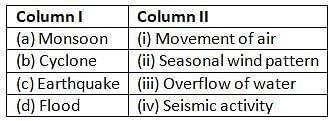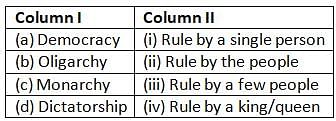Class 6 Exam > Class 6 Tests > Social Studies (SST) Class 6 > Social Studies High Order Thinking Skills (HOTs) - 1 - Class 6 MCQ
Social Studies High Order Thinking Skills (HOTs) - 1 - Class 6 MCQ
Test Description
10 Questions MCQ Test Social Studies (SST) Class 6 - Social Studies High Order Thinking Skills (HOTs) - 1
Social Studies High Order Thinking Skills (HOTs) - 1 for Class 6 2025 is part of Social Studies (SST) Class 6 preparation. The Social Studies High Order Thinking Skills (HOTs) - 1 questions and answers have been
prepared according to the Class 6 exam syllabus.The Social Studies High Order Thinking Skills (HOTs) - 1 MCQs are made for Class 6 2025 Exam. Find important
definitions, questions, notes, meanings, examples, exercises, MCQs and online tests for Social Studies High Order Thinking Skills (HOTs) - 1 below.
Solutions of Social Studies High Order Thinking Skills (HOTs) - 1 questions in English are available as part of our Social Studies (SST) Class 6 for Class 6 & Social Studies High Order Thinking Skills (HOTs) - 1 solutions in
Hindi for Social Studies (SST) Class 6 course. Download more important topics, notes, lectures and mock
test series for Class 6 Exam by signing up for free. Attempt Social Studies High Order Thinking Skills (HOTs) - 1 | 10 questions in 15 minutes | Mock test for Class 6 preparation | Free important questions MCQ to study Social Studies (SST) Class 6 for Class 6 Exam | Download free PDF with solutions
Social Studies High Order Thinking Skills (HOTs) - 1 - Question 1
Which of the following is not a feature of the Indian Parliament?
(i) It consists of two houses
(ii) It is the supreme legislative body of India
(iii) It consists of the President of India
(iv) It is responsible for the implementation of laws
Detailed Solution for Social Studies High Order Thinking Skills (HOTs) - 1 - Question 1
Social Studies High Order Thinking Skills (HOTs) - 1 - Question 2
Which of the following is not a function of the Executive branch of the Indian Government?
(i) Implementing laws
(ii) Making laws
(iii) Enforcing laws
(iv) Conducting foreign relations
Detailed Solution for Social Studies High Order Thinking Skills (HOTs) - 1 - Question 2
Social Studies High Order Thinking Skills (HOTs) - 1 - Question 3
Select the correct statement.
(i) The Tropic of Cancer passes through India.
(ii) Mount Everest is in the Alps.
(iii) The Nile is the longest river in the world.
(iv) Australia is both a country and a continent.
Detailed Solution for Social Studies High Order Thinking Skills (HOTs) - 1 - Question 3
Social Studies High Order Thinking Skills (HOTs) - 1 - Question 4
Select the correct statement.
(i) India shares its longest border with Bangladesh.
(ii) The capital of Canada is Toronto.
(iii) The Sahara Desert covers parts of North Africa.
(iv) The Amazon is the widest river in the world.
(i) India shares its longest border with Bangladesh.
(ii) The capital of Canada is Toronto.
(iii) The Sahara Desert covers parts of North Africa.
(iv) The Amazon is the widest river in the world.
Detailed Solution for Social Studies High Order Thinking Skills (HOTs) - 1 - Question 4
Social Studies High Order Thinking Skills (HOTs) - 1 - Question 5
Read the following statements carefully and identify the major occupation of the people in the Ganges Plains.
(i) Fertile soil due to alluvial deposits
(ii) Presence of perennial rivers
(iii) High population density
(iv) Presence of a variety of crops
(i) Fertile soil due to alluvial deposits
(ii) Presence of perennial rivers
(iii) High population density
(iv) Presence of a variety of crops
Detailed Solution for Social Studies High Order Thinking Skills (HOTs) - 1 - Question 5
Social Studies High Order Thinking Skills (HOTs) - 1 - Question 6
Identify the following historical figure based on the statements:
(i) Known as the "Father of the Nation" in India
(ii) Led the non-violent struggle for independence
(iii) Advocated for civil rights and freedoms
(iv) Promoted the idea of Satyagraha
(i) Known as the "Father of the Nation" in India
(ii) Led the non-violent struggle for independence
(iii) Advocated for civil rights and freedoms
(iv) Promoted the idea of Satyagraha
Detailed Solution for Social Studies High Order Thinking Skills (HOTs) - 1 - Question 6
Social Studies High Order Thinking Skills (HOTs) - 1 - Question 7
Read the two statements and choose the correct option.
Statement 1 - The Earth revolves around the Sun in an elliptical orbit.
Statement 2 - This revolution causes the change in seasons.
Statement 1 - The Earth revolves around the Sun in an elliptical orbit.
Statement 2 - This revolution causes the change in seasons.
Detailed Solution for Social Studies High Order Thinking Skills (HOTs) - 1 - Question 7
Social Studies High Order Thinking Skills (HOTs) - 1 - Question 8
Read the two statements and choose the correct option.
Statement 1 - The Indus Valley Civilization is also known as the Harappan Civilization.
Statement 2 - The main sites of this civilization were located in present-day India.
Statement 1 - The Indus Valley Civilization is also known as the Harappan Civilization.
Statement 2 - The main sites of this civilization were located in present-day India.
Detailed Solution for Social Studies High Order Thinking Skills (HOTs) - 1 - Question 8
Social Studies High Order Thinking Skills (HOTs) - 1 - Question 9
Match the columns and select the correct option from the given codes.

Detailed Solution for Social Studies High Order Thinking Skills (HOTs) - 1 - Question 9
Social Studies High Order Thinking Skills (HOTs) - 1 - Question 10
Match the columns and select the correct option from the given codes.

Detailed Solution for Social Studies High Order Thinking Skills (HOTs) - 1 - Question 10
|
69 videos|386 docs|80 tests
|
Information about Social Studies High Order Thinking Skills (HOTs) - 1 Page
In this test you can find the Exam questions for Social Studies High Order Thinking Skills (HOTs) - 1 solved & explained in the simplest way possible.
Besides giving Questions and answers for Social Studies High Order Thinking Skills (HOTs) - 1, EduRev gives you an ample number of Online tests for practice


















